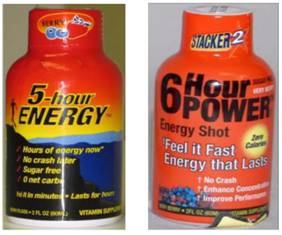
October 2012 Issue
Civil Cases
Innovation Ventures, LLC v. N.V.E., Inc.,
2012 WL 4039843 (6th Cir. Sept. 13, 2012)
CASE SUMMARY
FACTS
Living Essentials (“LE”), maker of the 5-HOUR ENERGY shot, brought a claim for trademark infringement against N.V.E., Inc. (“NVE”), a competitor and maker of the 6 HOUR POWER energy shot. Below is a depiction of both parties’ products:

NVE brought a counterclaim against LE, asserting that a recall notice for a “‘6 Hour’ Energy shot” that LE distributed after it prevailed in an unrelated trade-dress litigation, constituted false advertising. Specifically, LE had prevailed in a trade-dress infringement litigation against a third-party maker of the 6-HOUR ENERGY SHOT. Following that victory, LE distributed the following recall notice to 110,000 convenience stores and truck stops, and retailer magazines:
RECALL OF “6 HOUR” SHOT ORDEREDIn its counterclaim, NVE asserted that the recall notice constituted false advertising because it led numerous retailers to mistakenly believe that NVE’s 6 HOUR POWER product was affected by the recall, which cost NVE millions in lost sales. The district court granted the parties’ cross-motions for summary judgment, finding no likelihood of confusion between 5-HOUR ENERGY and 6 HOUR POWER, and holding that the recall notice did not constitute false advertising. The Sixth Circuit reversed.
Court orders immediate stop to manufacturing, distributing and sale of 6 Hour Energy shot.Dear Customer,
We are pleased to announce that we won a decision against a “6 Hour” energy shot that closely mimicked 5-Hour Energy®. The United States District Court, in Case No. 08-CV-10983, issued a preliminary injunction ordering the immediate recall of the “6 Hour” product, and told its manufacturer to stop making, distributing and selling it.
If you have any of the “6 Hour” energy shots in your store(s) or warehouse(s) contact the product’s manufacturer or your distributor to return the product immediately.
DO NOT RETURN ANY 5-HOUR ENERGY®. It can be difficult to tell 5-Hour Energy® apart from the “6 Hour” knockoff product. If you have any questions, please call us at 248-960-1700 ext. 217.
We will vigorously protect the 5-Hour Energy® brand by pursuing all legal avenues against anyone encroaching on it, or creating confusion in the marketplace.
ANALYSIS
Regarding LE’s trademark-infringement claim, the appeals court concluded that LE’s 5-HOUR ENERGY mark is protectable because it is suggestive rather than descriptive. In holding so, the court posed a number of hypothetical questions: “[H]ow would the energy be transferred? Through food? Through drink? Through injections? Through pills? Through exercise? Also, one would ask what kind of energy is the mark referring to?” The court held that such “cognitive inferences” were indicative of the suggestive nature of the mark. Having determined that the 5-HOUR ENERGY mark was protectable, the court concluded that the case should proceed to trial on the fact-intensive issue of likelihood of confusion.
Addressing NVE’s false-advertising counterclaim, the Sixth Circuit first grappled with the issue of whether the recall notice was literally false or misleading. The court held that the “language of the recall notice teeters on the cusp between ambiguity and literal falsity in two main respects—descriptive and grammatical.”
The court noted that, although only one product—6-HOUR ENERGY SHOT (and not other “6 Hour” products put out by other manufacturers, such as 6 HOUR POWER)—was subject to the adverse trade-dress ruling and recall, LE’s recall notice simply referred to “‘6 Hour’ Energy shot,” and in the notice “‘6 Hour’ was in quotations, while ‘energy shot’ was not—without a prefatory article.” The notice did not identify the name of the recalled product.
On a similar note, the court noted that, in some instances, the recall notice used “an indefinite prefatory article, ‘a,’” to refer to “a ‘6 Hour’ energy shot,” suggesting that there may be more than one “6 Hour” product at issue, as well as a prefatory pronoun “any,” suggesting that any shot bearing the name “6 Hour” was subject to recall. Elsewhere, however, the recall notice used the prefatory article “the” when discussing “‘6 Hour’ energy shots,” suggesting that only one product was subject to recall.
The court also concluded that the far-reaching statement in the recall that LE “w[o]n a decision against a ‘6 Hour’ energy shot” was “not literally true” because LE merely won a decision as it related to the look and feel of the packaging design.
Although a close question, the court ultimately concluded that the overall language of the recall notice was not literally false and that a genuine dispute existed as to whether the notice was misleading.
In support of its claim that the recall notice misled retailers, NVE introduced evidence that its distributors received numerous calls from convenience stores and truck-stop retailers, who received the recall notice and wanted to return the 6 HOUR POWER product. The court concluded that the fact that so many people called NVE immediately after they received the recall notice at the very least raised an issue for trial as to whether a significant portion of the recall recipients was deceived into thinking that NVE’s 6 HOUR POWER product was affected by the recall. CONCLUSION
Ironically, the 5-HOUR ENERGY maker was so energetic in leveraging its court victory against a competitor on a previous Lanham Act claim that it now finds itself on the defense in this current case, which serves as an important reminder of how crucial it is for companies to accurately describe their courtroom victories.